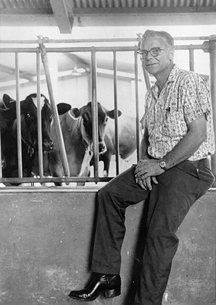 1922-1976
1922-1976
Magnar Ronning migrated from Norway to a dryland wheat farm in eastern Montana as a child. He enrolled at Montana State University as a Dairy Science major. His education was interupted by a four-year stint in the military during World War II where he was assigned to a special Norwegian-speaking ski patrol. In 1948 he completed his Baccalaureate degree, then went on to receive both MS and PhD degrees in Nutrition from Pennsylvania State University.
Dr. Ronning taught and did research at Oklahoma State University before coming to the Department of Animal Science at UC Davis. He excelled in administration and international service as well as teaching and research. He served as Department Chair from 1968 to 1973. From 1973 until his death in 1976 he served with distinction as Associate Dean for Animal Science and Resident Instruction in the College of Agricultural and Environmental Sciences.
Mag's research involved nutrition of the dairy calf. He was an unselfish investigator who freely contributed ideas, time, and resources in collaborative efforts. His graduate students became leaders in their fields of investigation as they furthered ideas begun with him. His leadership was recognized for his contributions to dairy cattle nutrition by the American Feed Manufacturers Award and he was given an "Award of Merit" by the American Forage and Grasslands Council.
In 1963 and 1964 he was a Fulbright Fellow to Cairo University and Alexandria University in Egypt. When the University of California accepted leadership in the University of Chile Convenio, Mag was selected to lead this joint agricultural program.
Mag was an effective and popular teacher, specializing in dairy nutrition, energy metabolism, and ruminant nutrition. The Magnar Ronning Award for Outstanding Teaching is presented yearly to several highly qualified and deserving faculty members.
He always had time for his individual advisees, understanding their concerns and helping them maintain their self esteem. He contributed to the Davis community through leadership in the Boy Scouts of America. He and his wife, Jane, maintained their home as a popular gathering spot for students both native and foreign.
